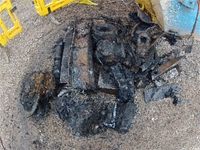Rubble, car parts and industrial waste found in Plymouth's sewers
27th November 2014

Demolition material, steel pipes, car parts and marine scrap are among the items that have been removed from Plymouth's sewers during routine maintenance work.
South West Water has been checking and clearing sewers in areas of Plymouth where there have previously been problems with flooding from the sewerage network.
An investigation into the sewer under King Street, which runs to Millbay Docks, indicated that it was partially blocked by a large volume of demolition rubble, which was acting as a dam. Around two tonnes of this material has now been removed.
An investigation in the surface water sewer in Millbay, which runs from Western Approach and discharges in Millbay Docks, showed that a 'beach' had built up in front of and blocked the flap valves which allow surface water to exit the network. The material in the 'beach' included naturally occurring materials but also a large volume of demolition material, including the remains of an old barge. This material has now been cleared.
Meanwhile, scrap steel, car parts and marine scrap have been removed from the strategic sewer running beneath Victoria Wharf, which connects the Exeter Street area to the sewage pumping station in Cattedown. This included a crane snatch block, rolled steel joists, two car gear boxes and various steel pipes and bars.
South West Water's Waste Water Operations Manager, Nick Murch, said: "Every year, South West Water has to clear up to 8,500 blockages in its sewers, at a cost to the company and its customers of around £4million.
"Blocked sewers can cause flooding and pollution. Sewer flooding is unpleasant enough when it affects roads and open spaces but can be devastating when it affects homes and businesses. The risk of sewer flooding increases during times of heavy rainfall when surface water run-off from roads and properties rushes into the combined network, particularly when sewers are already partially blocked by material that has no business there.
"We are committed to actively looking for and removing blockages within the sewerage network in Plymouth but we would urge everyone to play their part in keeping our sewers clear.
"In addition to reminding people not to use their toilets to dispose of non-biodegradable items such as nappies and cotton buds, and to avoid putting food waste including fat down their sinks, it would appear we also need to ask people not to use the sewerage network to dispose of rubble, old cars and industrial waste."
Notes for editors
- South West Water provides water and sewerage services to over 1.7 million people across Devon, Cornwall and parts of Somerset and Dorset
- South West Water operates over 640 sewage treatment works
- On average, the company treats 585 megalitres (129 million gallons) of sewage every day
- South West Water maintains 15,570km of public sewers
- Clean Sweep transformed bathing waters in the South West by adding 40 sewage treatment works and the equivalent of 86 Olympic-sized swimming pools of extra storm water storage, at a cost of £2billion
Published: 27 November 2014
For further information please contact:
Press Office
South West Water
www.southwestwater.co.uk/contactus
